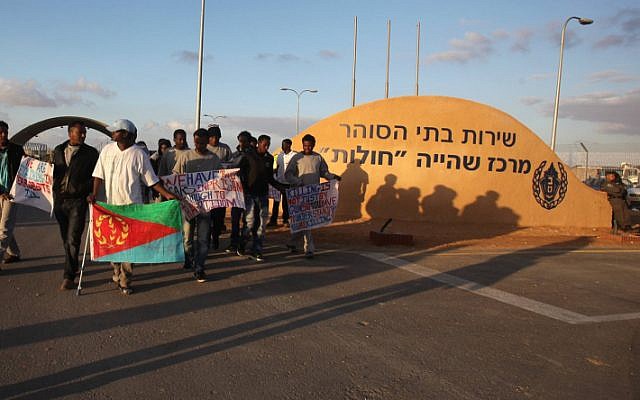By TOI STAFF 18 November 2017
African migrants protest outside Holot detention center near Ktsiot, in the Negev Desert, southern Israel, February 17, 2014. (photo credit: FLASH90)
The UN refugee agency expressed “serious concern” Friday over Israel’s plan to deport or jail thousands of African migrants in the coming months.
The proposal by Interior Minister Aryeh Deri and Public Security Minister Gilad Erdan would shutter the southern Israeli Holot detention center for African migrants within four months, in anticipation of “large-scale” deportations. Those who refuse deportation will be jailed.
Ministers are set to vote on the new plan Sunday.
In a statement, the United Nations High Commissioner for Refugees said it was “seriously concerned by proposals announced yesterday… Under these proposals, Eritreans and Sudanese asylum-seekers and refugees would be compelled to accept relocation to countries in Africa or face imprisonment in Israel.”
The agency noted that “Israel has legal obligations to protect refugees and other persons in need of international protection.”
The Israeli plan acknowledges efforts to step up deportations of African migrants in the coming months.
“In light of the intention to see the departure of infiltrators on a large scale to third countries, we may reconsider the need for the continued existence of the Holot facility, as the infiltrators’ departure could come directly from city centers to the third countries,” it said.
Ministers suggested keeping Holot open for another four months, after which it would close unless ministers sign another extension.
In August, the High Court of Justice approved the emigration policy, but also ruled that Israeli authorities had to first ensure that the countries to which migrants were being deported were safe. Though the state hasn’t named the third countries, they have been identified in media reports as Rwanda and Uganda.
Expulsion to a third country is largely unprecedented in the Western world. Italy and Australia signed similar agreements with third-party countries — Italy with Libya, and Australia with Malaysia — but both proposals were shot down by local courts. In both cases, courts ruled the bills inconsistent with international law and the 1951 UN convention on refugees — to which Israel is also a party.
The Population and Immigration Authority says over 40,000 illegal African migrants are residing in Israel as of 2016, almost all from Eritrea and Sudan. Many live in the poorer neighborhoods of southern Tel Aviv. Some Israeli residents have blamed them for rising crime rates in the city.
Many of the migrants say they are fleeing conflict and persecution and are seeking refugee status. Israeli officials contend they are economic migrants, and have resisted calls to recognize them as refugees.
Marissa Newman contributed to this report.